Managing Health Services During an Economic Crisis: Challenges
VerifiedAdded on 2021/01/02
|9
|2514
|56
Report
AI Summary
This report examines the multifaceted impact of economic crises on health services and the specific challenges faced by health service managers. It begins by defining economic crises and their broader societal effects, particularly on healthcare, including increased unemployment, poverty, and mental health issues. The report then identifies key challenges for health service managers, such as managing staff motivation, declining profits, and maintaining service quality during financial constraints. The report highlights the importance of strategic planning, cost-effective measures, and collaboration to mitigate these challenges. It also emphasizes the need to consider the impact of economic downturns on nursing staff and patient care. The report concludes by underscoring the critical role of health service managers in navigating economic crises, adapting policies, and ensuring the delivery of essential healthcare services.
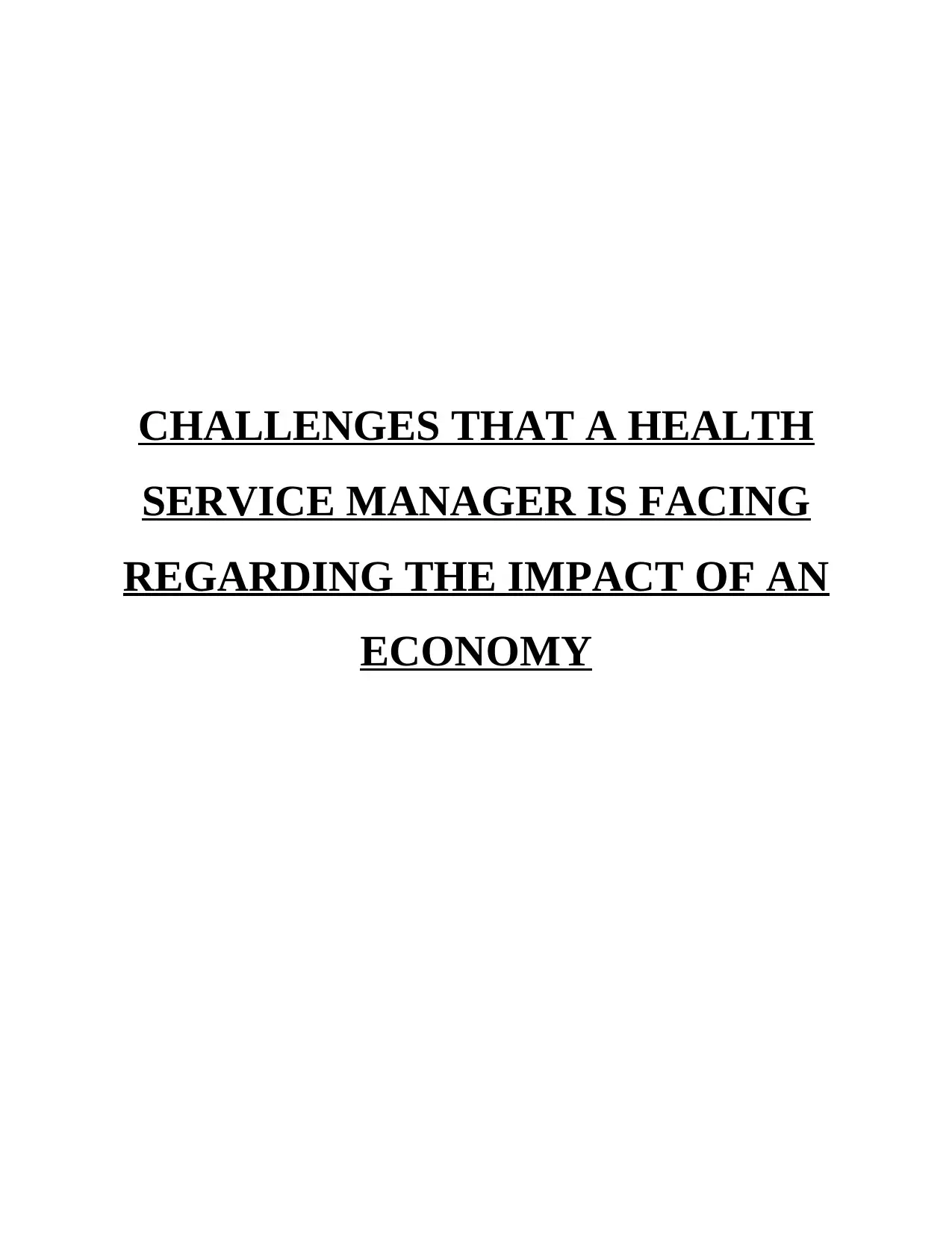
CHALLENGES THAT A HEALTH
SERVICE MANAGER IS FACING
REGARDING THE IMPACT OF AN
ECONOMY
SERVICE MANAGER IS FACING
REGARDING THE IMPACT OF AN
ECONOMY
Paraphrase This Document
Need a fresh take? Get an instant paraphrase of this document with our AI Paraphraser
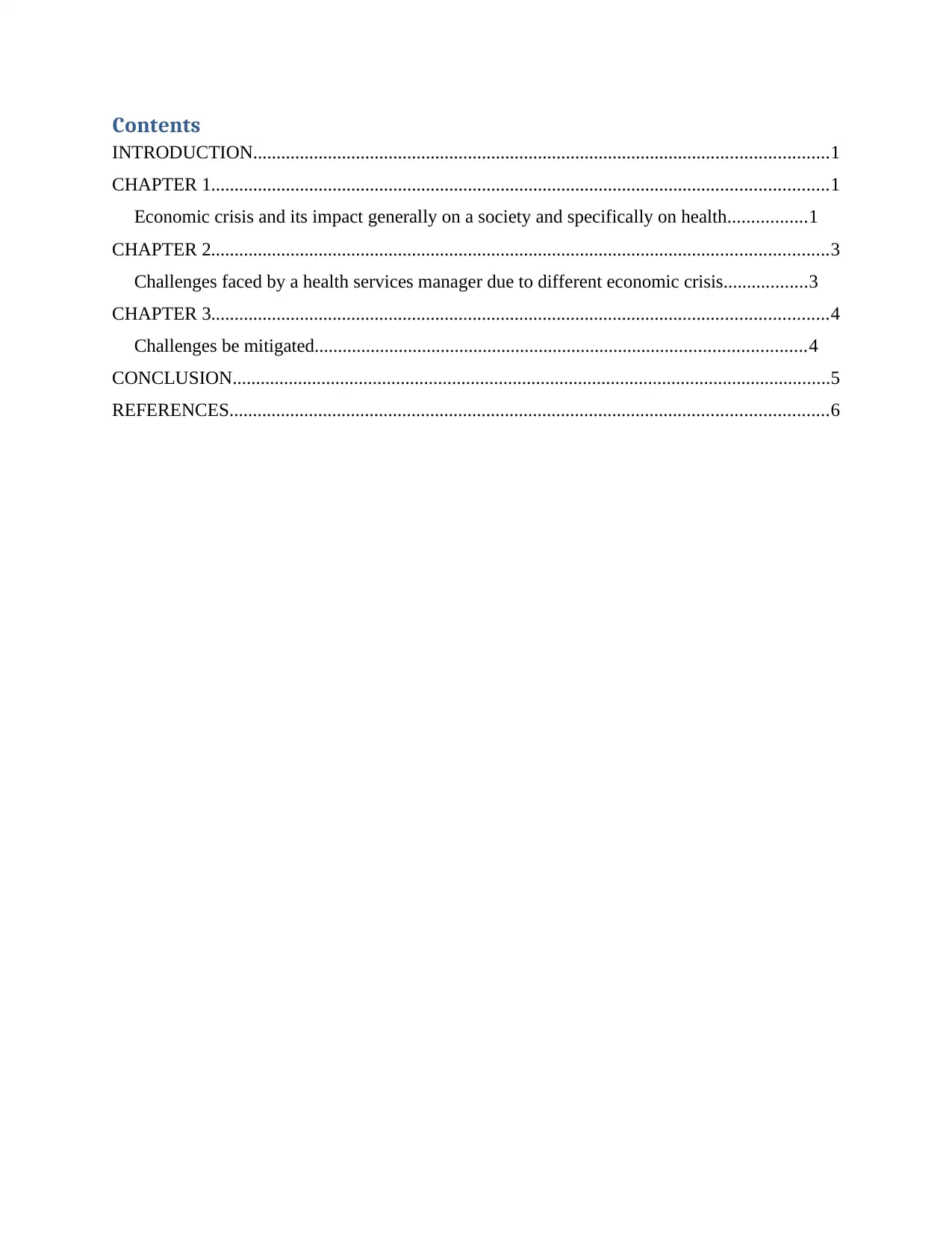
Contents
INTRODUCTION...........................................................................................................................1
CHAPTER 1....................................................................................................................................1
Economic crisis and its impact generally on a society and specifically on health.................1
CHAPTER 2....................................................................................................................................3
Challenges faced by a health services manager due to different economic crisis..................3
CHAPTER 3....................................................................................................................................4
Challenges be mitigated.........................................................................................................4
CONCLUSION................................................................................................................................5
REFERENCES................................................................................................................................6
INTRODUCTION...........................................................................................................................1
CHAPTER 1....................................................................................................................................1
Economic crisis and its impact generally on a society and specifically on health.................1
CHAPTER 2....................................................................................................................................3
Challenges faced by a health services manager due to different economic crisis..................3
CHAPTER 3....................................................................................................................................4
Challenges be mitigated.........................................................................................................4
CONCLUSION................................................................................................................................5
REFERENCES................................................................................................................................6

⊘ This is a preview!⊘
Do you want full access?
Subscribe today to unlock all pages.

Trusted by 1+ million students worldwide
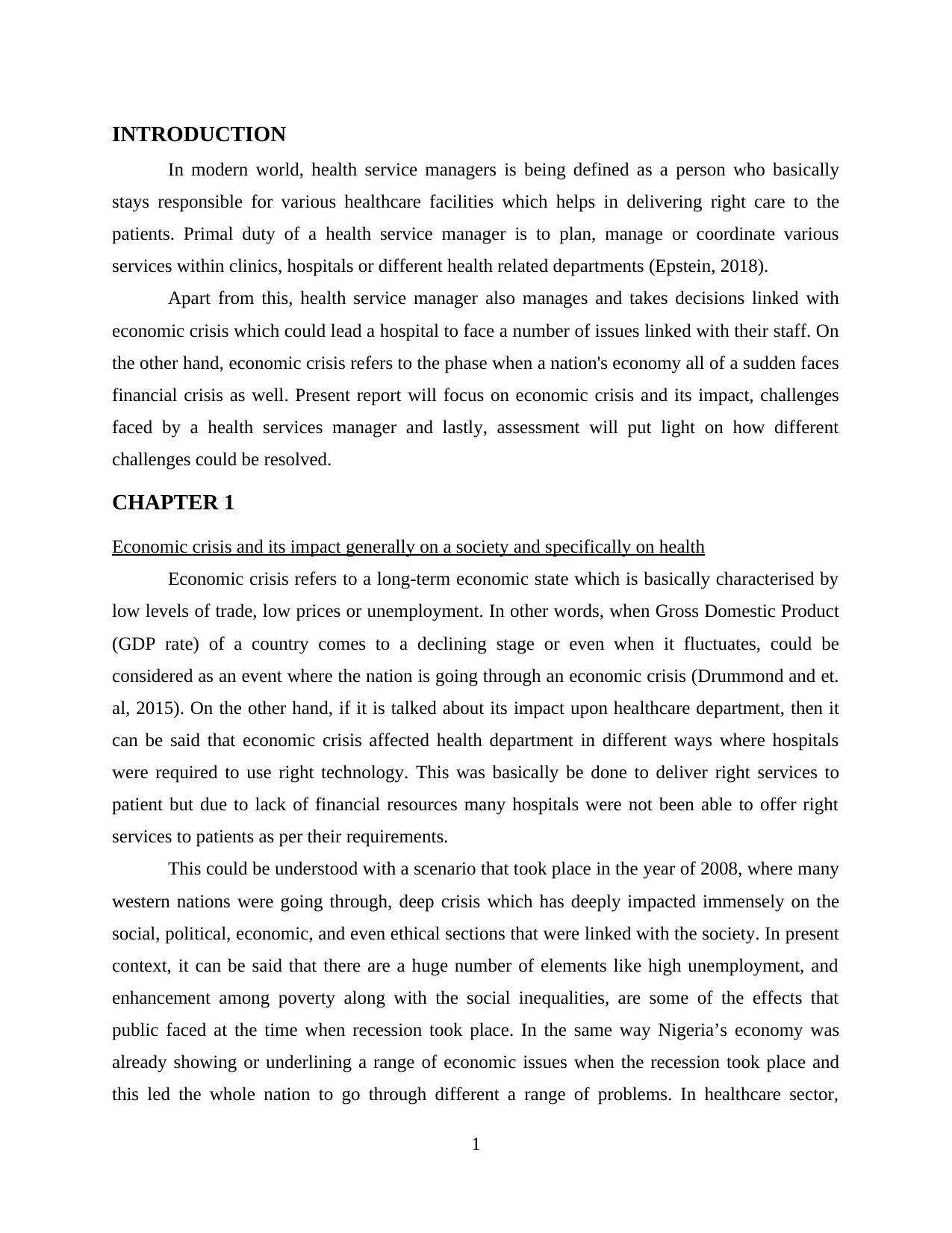
INTRODUCTION
In modern world, health service managers is being defined as a person who basically
stays responsible for various healthcare facilities which helps in delivering right care to the
patients. Primal duty of a health service manager is to plan, manage or coordinate various
services within clinics, hospitals or different health related departments (Epstein, 2018).
Apart from this, health service manager also manages and takes decisions linked with
economic crisis which could lead a hospital to face a number of issues linked with their staff. On
the other hand, economic crisis refers to the phase when a nation's economy all of a sudden faces
financial crisis as well. Present report will focus on economic crisis and its impact, challenges
faced by a health services manager and lastly, assessment will put light on how different
challenges could be resolved.
CHAPTER 1
Economic crisis and its impact generally on a society and specifically on health
Economic crisis refers to a long-term economic state which is basically characterised by
low levels of trade, low prices or unemployment. In other words, when Gross Domestic Product
(GDP rate) of a country comes to a declining stage or even when it fluctuates, could be
considered as an event where the nation is going through an economic crisis (Drummond and et.
al, 2015). On the other hand, if it is talked about its impact upon healthcare department, then it
can be said that economic crisis affected health department in different ways where hospitals
were required to use right technology. This was basically be done to deliver right services to
patient but due to lack of financial resources many hospitals were not been able to offer right
services to patients as per their requirements.
This could be understood with a scenario that took place in the year of 2008, where many
western nations were going through, deep crisis which has deeply impacted immensely on the
social, political, economic, and even ethical sections that were linked with the society. In present
context, it can be said that there are a huge number of elements like high unemployment, and
enhancement among poverty along with the social inequalities, are some of the effects that
public faced at the time when recession took place. In the same way Nigeria’s economy was
already showing or underlining a range of economic issues when the recession took place and
this led the whole nation to go through different a range of problems. In healthcare sector,
1
In modern world, health service managers is being defined as a person who basically
stays responsible for various healthcare facilities which helps in delivering right care to the
patients. Primal duty of a health service manager is to plan, manage or coordinate various
services within clinics, hospitals or different health related departments (Epstein, 2018).
Apart from this, health service manager also manages and takes decisions linked with
economic crisis which could lead a hospital to face a number of issues linked with their staff. On
the other hand, economic crisis refers to the phase when a nation's economy all of a sudden faces
financial crisis as well. Present report will focus on economic crisis and its impact, challenges
faced by a health services manager and lastly, assessment will put light on how different
challenges could be resolved.
CHAPTER 1
Economic crisis and its impact generally on a society and specifically on health
Economic crisis refers to a long-term economic state which is basically characterised by
low levels of trade, low prices or unemployment. In other words, when Gross Domestic Product
(GDP rate) of a country comes to a declining stage or even when it fluctuates, could be
considered as an event where the nation is going through an economic crisis (Drummond and et.
al, 2015). On the other hand, if it is talked about its impact upon healthcare department, then it
can be said that economic crisis affected health department in different ways where hospitals
were required to use right technology. This was basically be done to deliver right services to
patient but due to lack of financial resources many hospitals were not been able to offer right
services to patients as per their requirements.
This could be understood with a scenario that took place in the year of 2008, where many
western nations were going through, deep crisis which has deeply impacted immensely on the
social, political, economic, and even ethical sections that were linked with the society. In present
context, it can be said that there are a huge number of elements like high unemployment, and
enhancement among poverty along with the social inequalities, are some of the effects that
public faced at the time when recession took place. In the same way Nigeria’s economy was
already showing or underlining a range of economic issues when the recession took place and
this led the whole nation to go through different a range of problems. In healthcare sector,
1
Paraphrase This Document
Need a fresh take? Get an instant paraphrase of this document with our AI Paraphraser
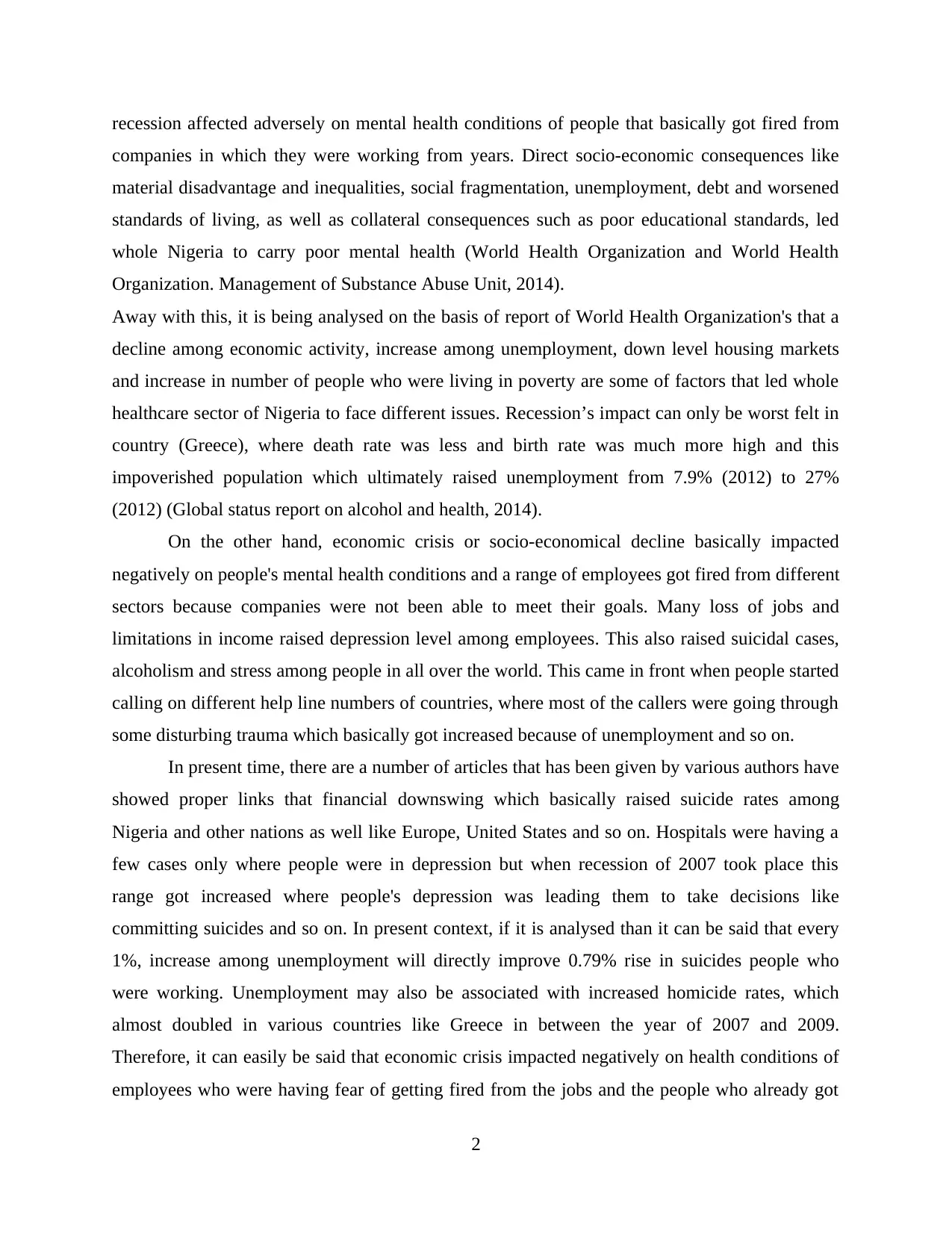
recession affected adversely on mental health conditions of people that basically got fired from
companies in which they were working from years. Direct socio-economic consequences like
material disadvantage and inequalities, social fragmentation, unemployment, debt and worsened
standards of living, as well as collateral consequences such as poor educational standards, led
whole Nigeria to carry poor mental health (World Health Organization and World Health
Organization. Management of Substance Abuse Unit, 2014).
Away with this, it is being analysed on the basis of report of World Health Organization's that a
decline among economic activity, increase among unemployment, down level housing markets
and increase in number of people who were living in poverty are some of factors that led whole
healthcare sector of Nigeria to face different issues. Recession’s impact can only be worst felt in
country (Greece), where death rate was less and birth rate was much more high and this
impoverished population which ultimately raised unemployment from 7.9% (2012) to 27%
(2012) (Global status report on alcohol and health, 2014).
On the other hand, economic crisis or socio-economical decline basically impacted
negatively on people's mental health conditions and a range of employees got fired from different
sectors because companies were not been able to meet their goals. Many loss of jobs and
limitations in income raised depression level among employees. This also raised suicidal cases,
alcoholism and stress among people in all over the world. This came in front when people started
calling on different help line numbers of countries, where most of the callers were going through
some disturbing trauma which basically got increased because of unemployment and so on.
In present time, there are a number of articles that has been given by various authors have
showed proper links that financial downswing which basically raised suicide rates among
Nigeria and other nations as well like Europe, United States and so on. Hospitals were having a
few cases only where people were in depression but when recession of 2007 took place this
range got increased where people's depression was leading them to take decisions like
committing suicides and so on. In present context, if it is analysed than it can be said that every
1%, increase among unemployment will directly improve 0.79% rise in suicides people who
were working. Unemployment may also be associated with increased homicide rates, which
almost doubled in various countries like Greece in between the year of 2007 and 2009.
Therefore, it can easily be said that economic crisis impacted negatively on health conditions of
employees who were having fear of getting fired from the jobs and the people who already got
2
companies in which they were working from years. Direct socio-economic consequences like
material disadvantage and inequalities, social fragmentation, unemployment, debt and worsened
standards of living, as well as collateral consequences such as poor educational standards, led
whole Nigeria to carry poor mental health (World Health Organization and World Health
Organization. Management of Substance Abuse Unit, 2014).
Away with this, it is being analysed on the basis of report of World Health Organization's that a
decline among economic activity, increase among unemployment, down level housing markets
and increase in number of people who were living in poverty are some of factors that led whole
healthcare sector of Nigeria to face different issues. Recession’s impact can only be worst felt in
country (Greece), where death rate was less and birth rate was much more high and this
impoverished population which ultimately raised unemployment from 7.9% (2012) to 27%
(2012) (Global status report on alcohol and health, 2014).
On the other hand, economic crisis or socio-economical decline basically impacted
negatively on people's mental health conditions and a range of employees got fired from different
sectors because companies were not been able to meet their goals. Many loss of jobs and
limitations in income raised depression level among employees. This also raised suicidal cases,
alcoholism and stress among people in all over the world. This came in front when people started
calling on different help line numbers of countries, where most of the callers were going through
some disturbing trauma which basically got increased because of unemployment and so on.
In present time, there are a number of articles that has been given by various authors have
showed proper links that financial downswing which basically raised suicide rates among
Nigeria and other nations as well like Europe, United States and so on. Hospitals were having a
few cases only where people were in depression but when recession of 2007 took place this
range got increased where people's depression was leading them to take decisions like
committing suicides and so on. In present context, if it is analysed than it can be said that every
1%, increase among unemployment will directly improve 0.79% rise in suicides people who
were working. Unemployment may also be associated with increased homicide rates, which
almost doubled in various countries like Greece in between the year of 2007 and 2009.
Therefore, it can easily be said that economic crisis impacted negatively on health conditions of
employees who were having fear of getting fired from the jobs and the people who already got
2
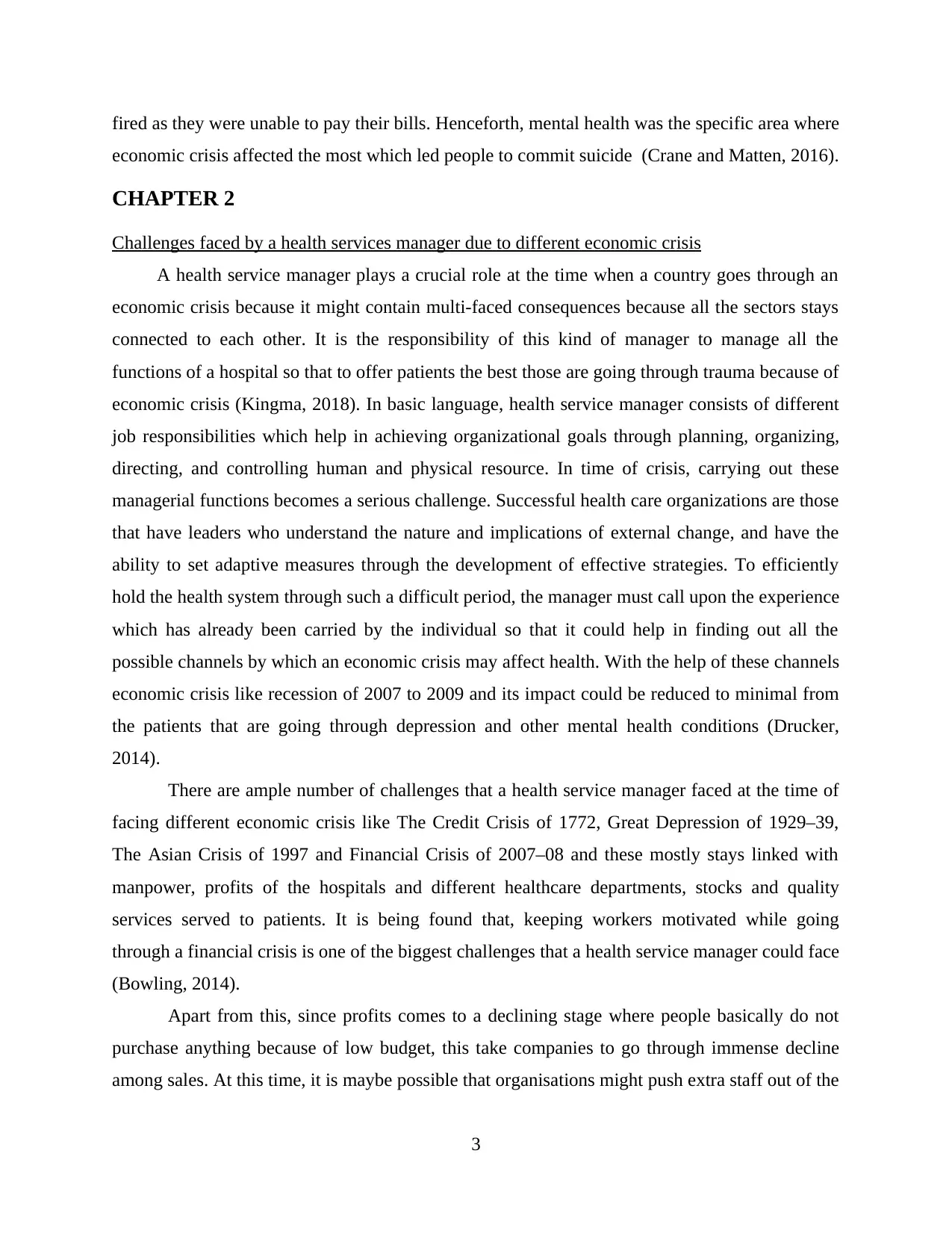
fired as they were unable to pay their bills. Henceforth, mental health was the specific area where
economic crisis affected the most which led people to commit suicide (Crane and Matten, 2016).
CHAPTER 2
Challenges faced by a health services manager due to different economic crisis
A health service manager plays a crucial role at the time when a country goes through an
economic crisis because it might contain multi-faced consequences because all the sectors stays
connected to each other. It is the responsibility of this kind of manager to manage all the
functions of a hospital so that to offer patients the best those are going through trauma because of
economic crisis (Kingma, 2018). In basic language, health service manager consists of different
job responsibilities which help in achieving organizational goals through planning, organizing,
directing, and controlling human and physical resource. In time of crisis, carrying out these
managerial functions becomes a serious challenge. Successful health care organizations are those
that have leaders who understand the nature and implications of external change, and have the
ability to set adaptive measures through the development of effective strategies. To efficiently
hold the health system through such a difficult period, the manager must call upon the experience
which has already been carried by the individual so that it could help in finding out all the
possible channels by which an economic crisis may affect health. With the help of these channels
economic crisis like recession of 2007 to 2009 and its impact could be reduced to minimal from
the patients that are going through depression and other mental health conditions (Drucker,
2014).
There are ample number of challenges that a health service manager faced at the time of
facing different economic crisis like The Credit Crisis of 1772, Great Depression of 1929–39,
The Asian Crisis of 1997 and Financial Crisis of 2007–08 and these mostly stays linked with
manpower, profits of the hospitals and different healthcare departments, stocks and quality
services served to patients. It is being found that, keeping workers motivated while going
through a financial crisis is one of the biggest challenges that a health service manager could face
(Bowling, 2014).
Apart from this, since profits comes to a declining stage where people basically do not
purchase anything because of low budget, this take companies to go through immense decline
among sales. At this time, it is maybe possible that organisations might push extra staff out of the
3
economic crisis affected the most which led people to commit suicide (Crane and Matten, 2016).
CHAPTER 2
Challenges faced by a health services manager due to different economic crisis
A health service manager plays a crucial role at the time when a country goes through an
economic crisis because it might contain multi-faced consequences because all the sectors stays
connected to each other. It is the responsibility of this kind of manager to manage all the
functions of a hospital so that to offer patients the best those are going through trauma because of
economic crisis (Kingma, 2018). In basic language, health service manager consists of different
job responsibilities which help in achieving organizational goals through planning, organizing,
directing, and controlling human and physical resource. In time of crisis, carrying out these
managerial functions becomes a serious challenge. Successful health care organizations are those
that have leaders who understand the nature and implications of external change, and have the
ability to set adaptive measures through the development of effective strategies. To efficiently
hold the health system through such a difficult period, the manager must call upon the experience
which has already been carried by the individual so that it could help in finding out all the
possible channels by which an economic crisis may affect health. With the help of these channels
economic crisis like recession of 2007 to 2009 and its impact could be reduced to minimal from
the patients that are going through depression and other mental health conditions (Drucker,
2014).
There are ample number of challenges that a health service manager faced at the time of
facing different economic crisis like The Credit Crisis of 1772, Great Depression of 1929–39,
The Asian Crisis of 1997 and Financial Crisis of 2007–08 and these mostly stays linked with
manpower, profits of the hospitals and different healthcare departments, stocks and quality
services served to patients. It is being found that, keeping workers motivated while going
through a financial crisis is one of the biggest challenges that a health service manager could face
(Bowling, 2014).
Apart from this, since profits comes to a declining stage where people basically do not
purchase anything because of low budget, this take companies to go through immense decline
among sales. At this time, it is maybe possible that organisations might push extra staff out of the
3
⊘ This is a preview!⊘
Do you want full access?
Subscribe today to unlock all pages.

Trusted by 1+ million students worldwide
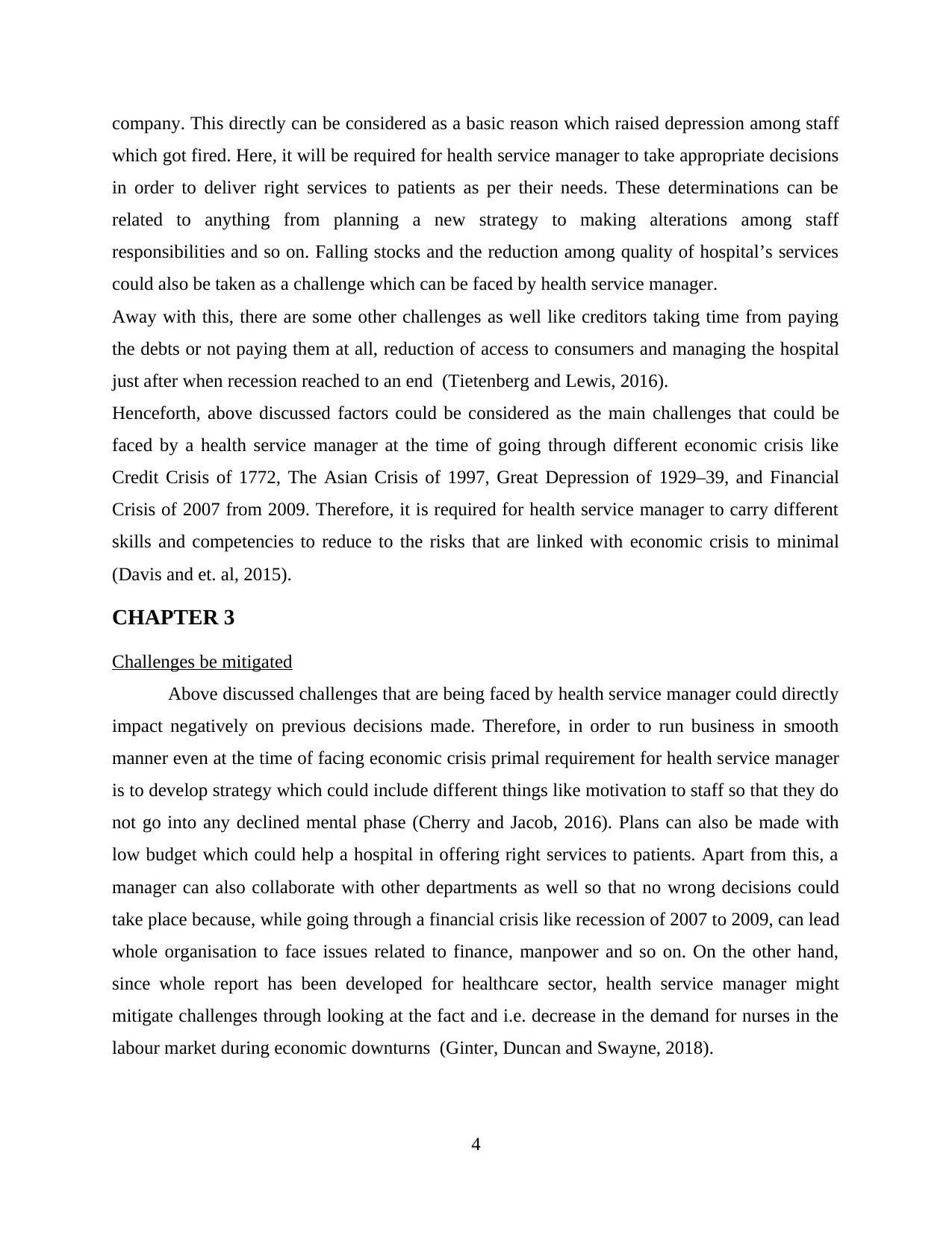
company. This directly can be considered as a basic reason which raised depression among staff
which got fired. Here, it will be required for health service manager to take appropriate decisions
in order to deliver right services to patients as per their needs. These determinations can be
related to anything from planning a new strategy to making alterations among staff
responsibilities and so on. Falling stocks and the reduction among quality of hospital’s services
could also be taken as a challenge which can be faced by health service manager.
Away with this, there are some other challenges as well like creditors taking time from paying
the debts or not paying them at all, reduction of access to consumers and managing the hospital
just after when recession reached to an end (Tietenberg and Lewis, 2016).
Henceforth, above discussed factors could be considered as the main challenges that could be
faced by a health service manager at the time of going through different economic crisis like
Credit Crisis of 1772, The Asian Crisis of 1997, Great Depression of 1929–39, and Financial
Crisis of 2007 from 2009. Therefore, it is required for health service manager to carry different
skills and competencies to reduce to the risks that are linked with economic crisis to minimal
(Davis and et. al, 2015).
CHAPTER 3
Challenges be mitigated
Above discussed challenges that are being faced by health service manager could directly
impact negatively on previous decisions made. Therefore, in order to run business in smooth
manner even at the time of facing economic crisis primal requirement for health service manager
is to develop strategy which could include different things like motivation to staff so that they do
not go into any declined mental phase (Cherry and Jacob, 2016). Plans can also be made with
low budget which could help a hospital in offering right services to patients. Apart from this, a
manager can also collaborate with other departments as well so that no wrong decisions could
take place because, while going through a financial crisis like recession of 2007 to 2009, can lead
whole organisation to face issues related to finance, manpower and so on. On the other hand,
since whole report has been developed for healthcare sector, health service manager might
mitigate challenges through looking at the fact and i.e. decrease in the demand for nurses in the
labour market during economic downturns (Ginter, Duncan and Swayne, 2018).
4
which got fired. Here, it will be required for health service manager to take appropriate decisions
in order to deliver right services to patients as per their needs. These determinations can be
related to anything from planning a new strategy to making alterations among staff
responsibilities and so on. Falling stocks and the reduction among quality of hospital’s services
could also be taken as a challenge which can be faced by health service manager.
Away with this, there are some other challenges as well like creditors taking time from paying
the debts or not paying them at all, reduction of access to consumers and managing the hospital
just after when recession reached to an end (Tietenberg and Lewis, 2016).
Henceforth, above discussed factors could be considered as the main challenges that could be
faced by a health service manager at the time of going through different economic crisis like
Credit Crisis of 1772, The Asian Crisis of 1997, Great Depression of 1929–39, and Financial
Crisis of 2007 from 2009. Therefore, it is required for health service manager to carry different
skills and competencies to reduce to the risks that are linked with economic crisis to minimal
(Davis and et. al, 2015).
CHAPTER 3
Challenges be mitigated
Above discussed challenges that are being faced by health service manager could directly
impact negatively on previous decisions made. Therefore, in order to run business in smooth
manner even at the time of facing economic crisis primal requirement for health service manager
is to develop strategy which could include different things like motivation to staff so that they do
not go into any declined mental phase (Cherry and Jacob, 2016). Plans can also be made with
low budget which could help a hospital in offering right services to patients. Apart from this, a
manager can also collaborate with other departments as well so that no wrong decisions could
take place because, while going through a financial crisis like recession of 2007 to 2009, can lead
whole organisation to face issues related to finance, manpower and so on. On the other hand,
since whole report has been developed for healthcare sector, health service manager might
mitigate challenges through looking at the fact and i.e. decrease in the demand for nurses in the
labour market during economic downturns (Ginter, Duncan and Swayne, 2018).
4
Paraphrase This Document
Need a fresh take? Get an instant paraphrase of this document with our AI Paraphraser
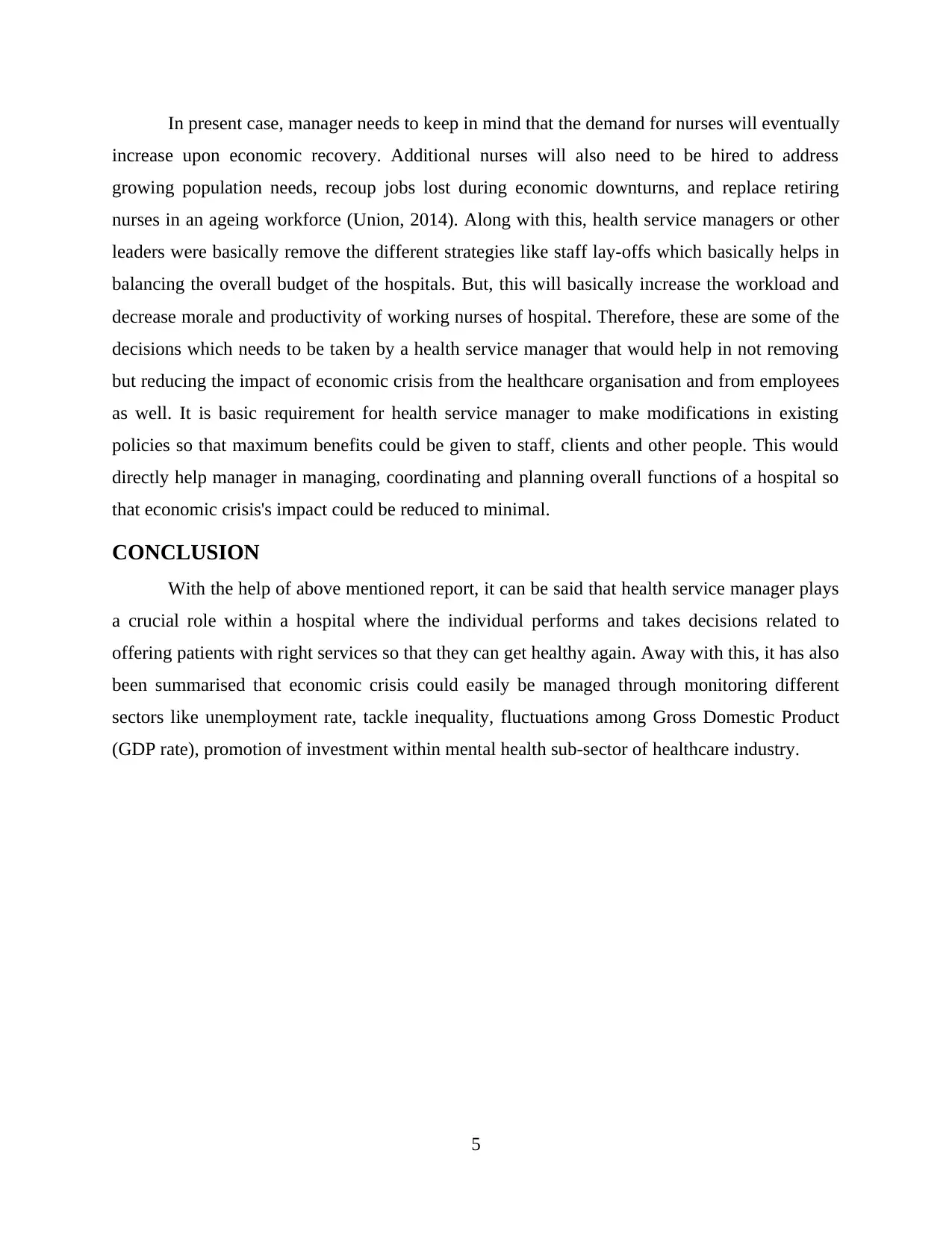
In present case, manager needs to keep in mind that the demand for nurses will eventually
increase upon economic recovery. Additional nurses will also need to be hired to address
growing population needs, recoup jobs lost during economic downturns, and replace retiring
nurses in an ageing workforce (Union, 2014). Along with this, health service managers or other
leaders were basically remove the different strategies like staff lay-offs which basically helps in
balancing the overall budget of the hospitals. But, this will basically increase the workload and
decrease morale and productivity of working nurses of hospital. Therefore, these are some of the
decisions which needs to be taken by a health service manager that would help in not removing
but reducing the impact of economic crisis from the healthcare organisation and from employees
as well. It is basic requirement for health service manager to make modifications in existing
policies so that maximum benefits could be given to staff, clients and other people. This would
directly help manager in managing, coordinating and planning overall functions of a hospital so
that economic crisis's impact could be reduced to minimal.
CONCLUSION
With the help of above mentioned report, it can be said that health service manager plays
a crucial role within a hospital where the individual performs and takes decisions related to
offering patients with right services so that they can get healthy again. Away with this, it has also
been summarised that economic crisis could easily be managed through monitoring different
sectors like unemployment rate, tackle inequality, fluctuations among Gross Domestic Product
(GDP rate), promotion of investment within mental health sub-sector of healthcare industry.
5
increase upon economic recovery. Additional nurses will also need to be hired to address
growing population needs, recoup jobs lost during economic downturns, and replace retiring
nurses in an ageing workforce (Union, 2014). Along with this, health service managers or other
leaders were basically remove the different strategies like staff lay-offs which basically helps in
balancing the overall budget of the hospitals. But, this will basically increase the workload and
decrease morale and productivity of working nurses of hospital. Therefore, these are some of the
decisions which needs to be taken by a health service manager that would help in not removing
but reducing the impact of economic crisis from the healthcare organisation and from employees
as well. It is basic requirement for health service manager to make modifications in existing
policies so that maximum benefits could be given to staff, clients and other people. This would
directly help manager in managing, coordinating and planning overall functions of a hospital so
that economic crisis's impact could be reduced to minimal.
CONCLUSION
With the help of above mentioned report, it can be said that health service manager plays
a crucial role within a hospital where the individual performs and takes decisions related to
offering patients with right services so that they can get healthy again. Away with this, it has also
been summarised that economic crisis could easily be managed through monitoring different
sectors like unemployment rate, tackle inequality, fluctuations among Gross Domestic Product
(GDP rate), promotion of investment within mental health sub-sector of healthcare industry.
5
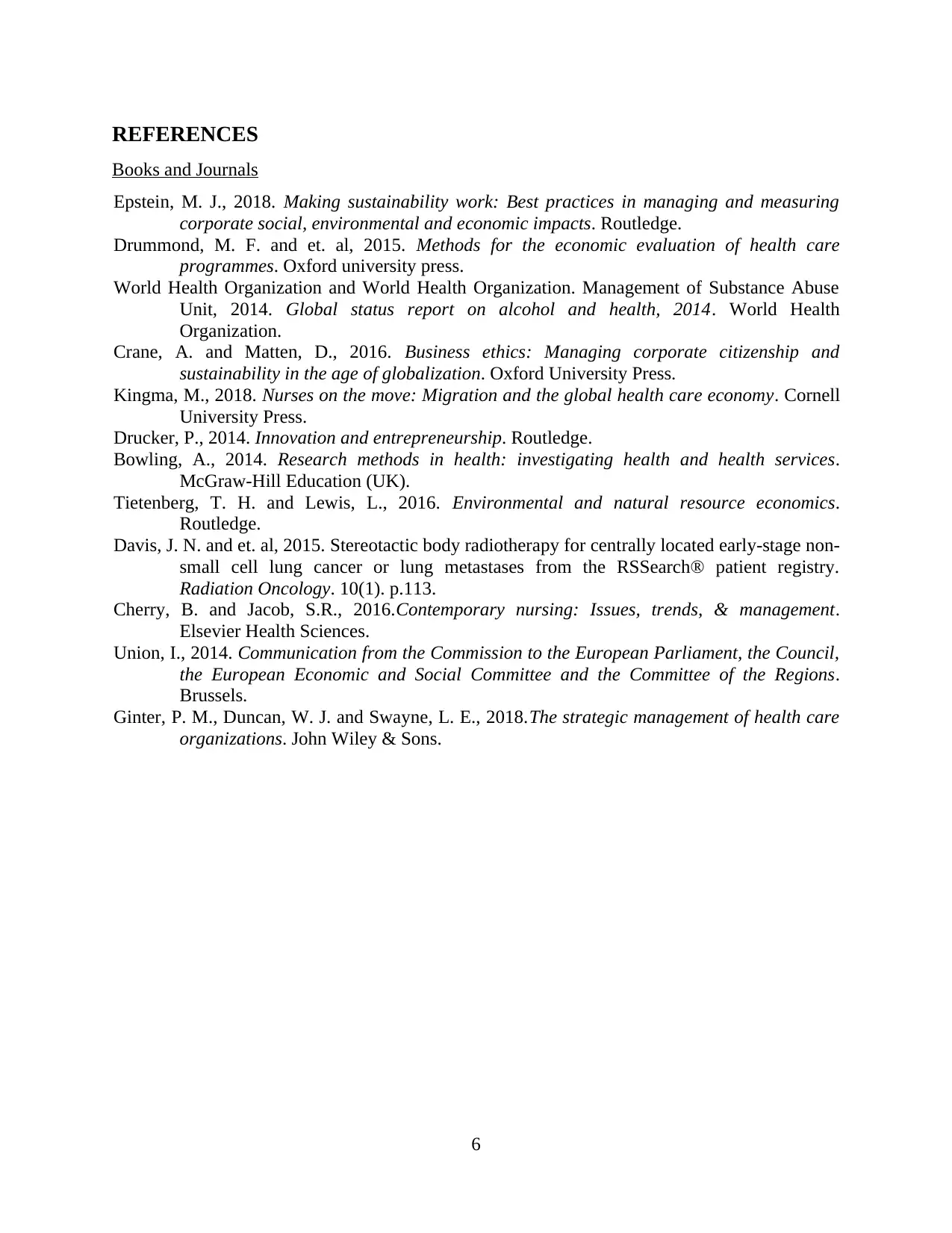
REFERENCES
Books and Journals
Epstein, M. J., 2018. Making sustainability work: Best practices in managing and measuring
corporate social, environmental and economic impacts. Routledge.
Drummond, M. F. and et. al, 2015. Methods for the economic evaluation of health care
programmes. Oxford university press.
World Health Organization and World Health Organization. Management of Substance Abuse
Unit, 2014. Global status report on alcohol and health, 2014. World Health
Organization.
Crane, A. and Matten, D., 2016. Business ethics: Managing corporate citizenship and
sustainability in the age of globalization. Oxford University Press.
Kingma, M., 2018. Nurses on the move: Migration and the global health care economy. Cornell
University Press.
Drucker, P., 2014. Innovation and entrepreneurship. Routledge.
Bowling, A., 2014. Research methods in health: investigating health and health services.
McGraw-Hill Education (UK).
Tietenberg, T. H. and Lewis, L., 2016. Environmental and natural resource economics.
Routledge.
Davis, J. N. and et. al, 2015. Stereotactic body radiotherapy for centrally located early-stage non-
small cell lung cancer or lung metastases from the RSSearch® patient registry.
Radiation Oncology. 10(1). p.113.
Cherry, B. and Jacob, S.R., 2016.Contemporary nursing: Issues, trends, & management.
Elsevier Health Sciences.
Union, I., 2014. Communication from the Commission to the European Parliament, the Council,
the European Economic and Social Committee and the Committee of the Regions.
Brussels.
Ginter, P. M., Duncan, W. J. and Swayne, L. E., 2018.The strategic management of health care
organizations. John Wiley & Sons.
6
Books and Journals
Epstein, M. J., 2018. Making sustainability work: Best practices in managing and measuring
corporate social, environmental and economic impacts. Routledge.
Drummond, M. F. and et. al, 2015. Methods for the economic evaluation of health care
programmes. Oxford university press.
World Health Organization and World Health Organization. Management of Substance Abuse
Unit, 2014. Global status report on alcohol and health, 2014. World Health
Organization.
Crane, A. and Matten, D., 2016. Business ethics: Managing corporate citizenship and
sustainability in the age of globalization. Oxford University Press.
Kingma, M., 2018. Nurses on the move: Migration and the global health care economy. Cornell
University Press.
Drucker, P., 2014. Innovation and entrepreneurship. Routledge.
Bowling, A., 2014. Research methods in health: investigating health and health services.
McGraw-Hill Education (UK).
Tietenberg, T. H. and Lewis, L., 2016. Environmental and natural resource economics.
Routledge.
Davis, J. N. and et. al, 2015. Stereotactic body radiotherapy for centrally located early-stage non-
small cell lung cancer or lung metastases from the RSSearch® patient registry.
Radiation Oncology. 10(1). p.113.
Cherry, B. and Jacob, S.R., 2016.Contemporary nursing: Issues, trends, & management.
Elsevier Health Sciences.
Union, I., 2014. Communication from the Commission to the European Parliament, the Council,
the European Economic and Social Committee and the Committee of the Regions.
Brussels.
Ginter, P. M., Duncan, W. J. and Swayne, L. E., 2018.The strategic management of health care
organizations. John Wiley & Sons.
6
⊘ This is a preview!⊘
Do you want full access?
Subscribe today to unlock all pages.

Trusted by 1+ million students worldwide
1 out of 9
Related Documents
Your All-in-One AI-Powered Toolkit for Academic Success.
+13062052269
info@desklib.com
Available 24*7 on WhatsApp / Email
![[object Object]](/_next/static/media/star-bottom.7253800d.svg)
Unlock your academic potential
Copyright © 2020–2026 A2Z Services. All Rights Reserved. Developed and managed by ZUCOL.





